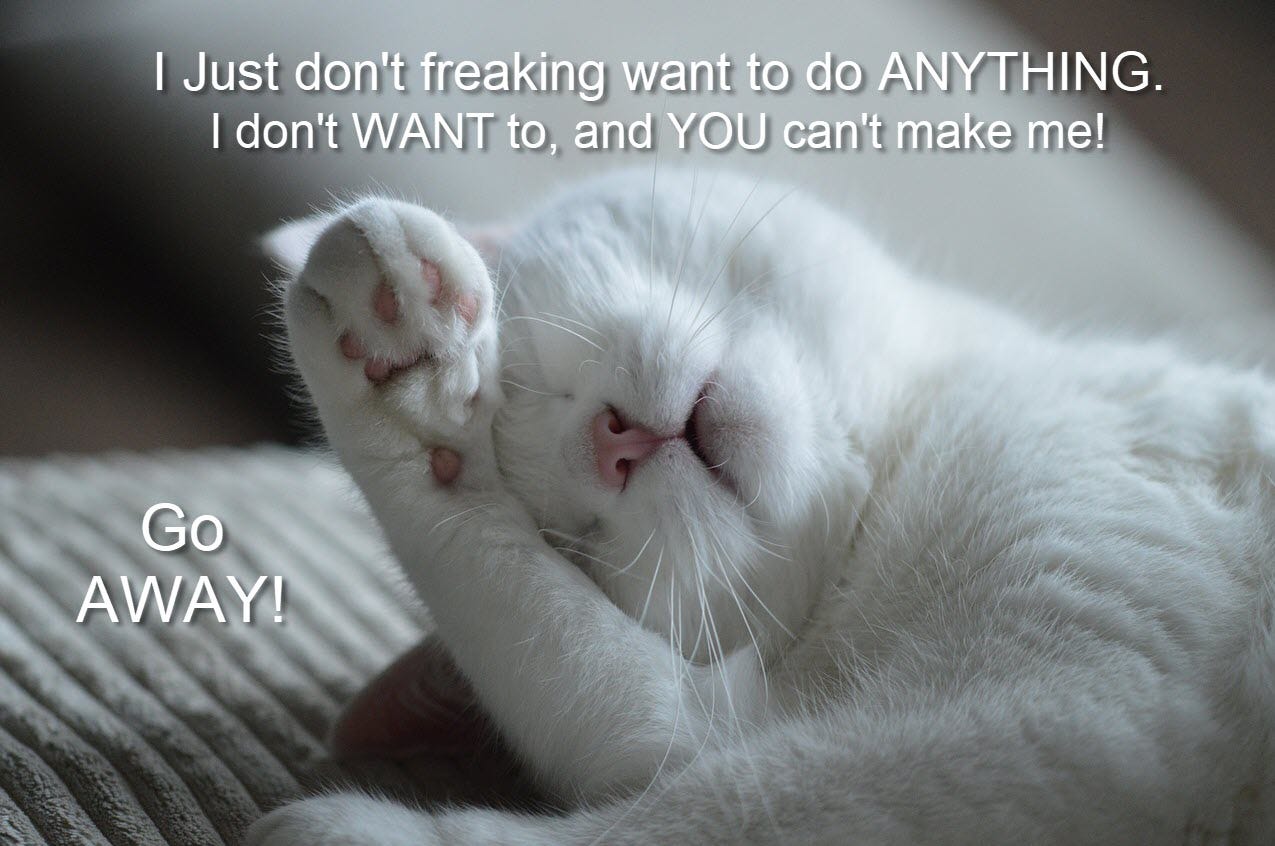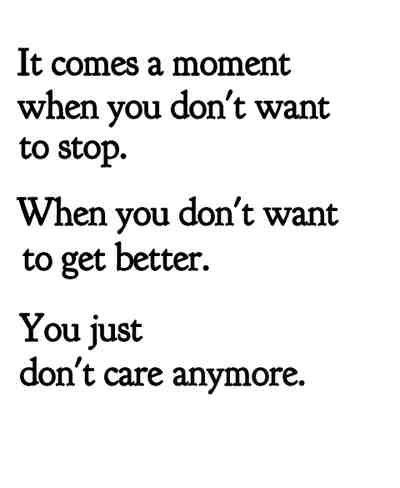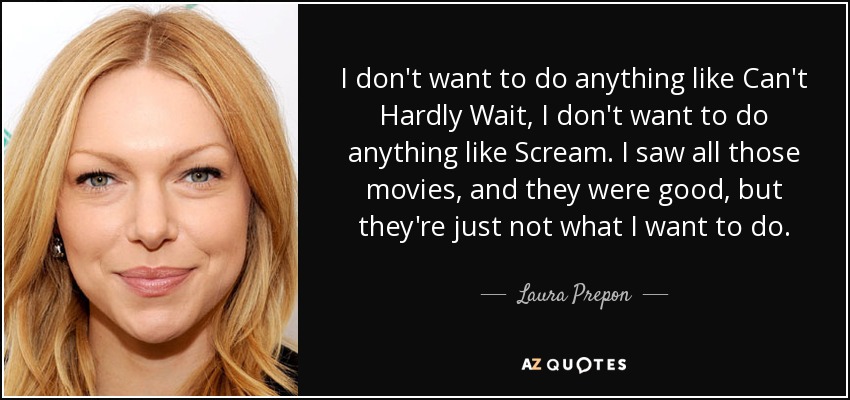 I Just Don't Freaking Want To Do ANYTHING. I Don't WANT To, and YOU Can't Make Me! | by Melanie Rockett | Freelance Writing Zone | Medium
I Just Don't Freaking Want To Do ANYTHING. I Don't WANT To, and YOU Can't Make Me! | by Melanie Rockett | Freelance Writing Zone | MediumYou think "I don't want to do anything else" and I ask you why? Silence Find out Why TodayBy: Updated January 04, 2021 Medically revised by: "I don't want to do anything"What it means when you don't want to do anything and how to get it done Have you ever felt like "I don't want to do anything" but you weren't sure why? One of the most frustrating things in life is to lose the momentum to do. It may be very discouraging to know that you have wonderful and great people and things that happen in your life and you just can't seem to enjoy them. In many cases we are not aware that feeling lazy can be a sign that we need to assist our mental health, well-being and participate in self-care. Feeling immotivated or apathetic towards life can happen to the best of us from time to time, and may have a particularly impact on young adults. Abuse survivors and victims of sexual assault often report high levels of apathy. Something keeps that from happening, but you don't know what it is. This is especially true if this has been going on for a long time. Looks like these feelings just came out of nowhere, and suddenly you find yourself without motivation to do anything else. So, you find yourself saying things like, "So you start asking yourself what's wrong with you." You can say, "I feel good, why can't I get the motivation to do anything? What's wrong with me?" Source: rawpixel.com If something of the above sounds familiar, you may need the help of a mental health provider to help support it through this. You may be suffering from depression. A professional can give you life advice and help you evaluate what is going on to rule out more serious problems. Your family may see that you go around your maze of the day and say that it is only laziness, but unless you are consciously choosing not to do anything, there may be more in it. Many people suffering from depression experience loss of interest or energy. It can feel as if all these feelings were completely out of control and you may need help gain control once again. If all you feel is to be lying on the couch and watch Netflix instead of going out and starting to live, more often than not, then there may be an underlying mental health condition that negatively affects you. These feelings can be situational, as if you experienced a break or were sick. They can also be longer in the long term in the form of depression, where those feelings of despair and sadness are dragged. Is it hard to get out of bed? Once you started the day, are you fighting to do things? What if it goes beyond these moments and you have no motivation to do anything? They're horrible feelings, and you don't have to suffer alone. There are successful tools to help you find and develop your sense of motivation and start living again. What can I do when I don't want to do anything? 1. What you can do now First, you may want to visit your primary care doctor, especially if these feelings are unusual for you. Your doctor will be able to perform some diagnostic tests and blood tests on you to rule out an underlying health problem to get to the root cause of what is causing these unmotivated thoughts and feelings. Some autoimmune diseases and vitamin deficiencies can cause lethargy and feelings and thoughts of invalidity or depression. Also, certain medicines may have some side effects that may cause these symptoms, too. If your doctor can identify the problem, the solution can be as simple as a vitamin supplement or other medication. For any guidance on medication, consult a licensed medical professional. If your doctor can't determine why you lack motivation, then you can refer you to a mental doctor or other specialist. Therapists can be used both in person and using an online platform, such as BetterHelp. It is easy to register for an online BetterHelp therapy account simply using your email address. An online therapist can be especially useful if you are finding it difficult to water the energy and go to an appointment. Instead, you can enter from the comfort of your own home without having to spend a lot of effort. Source: pexels.com2. How can I feel better when I don't want to do anything? First, it's important to understand that you're not alone. There are tens of thousands of people throughout America who have experienced some time in their lives. New parents may feel so lethargic and exhausted because of a new baby who does not leave their home for weeks. The important thing is to help figure out where feelings come from so you can find out what's wrong, start feeling better again, and get your energy back. Your therapist will discuss your feelings with you, try to determine what is wrong and help you form an action course to get back to your old me again. It is very important that you be 100% honest with him/her so that you have all the information you need to determine the treatment plan. It is important to be honest during therapy sessions. Keeping any information at this point will only be hurt, in the end, so please discuss all your thoughts and feelings freely. You may also recommend to your doctor or psychiatrist to try certain medicines, such as selective serotonin reuptake inhibitors (ISRS). Research suggests that ISRS can be beneficial to people with depression. It is important to talk to your doctor or psychiatrist about all potential medicines. Research also shows that conversation therapy can help reduce symptoms of depression in people, whether they face long-term or situational depression.3. Don't get hit by doing anything Above all, it's especially important that you don't get hit if you can't figure out the reasons behind how you feel. Not only will this not help, but it can let you feel worse than you were. You may feel frustrated with yourself and asking, "Why can't I be happy?" It can begin to affect your self-esteem and cause other health impediments. When I get to this point, it's time to find professional advice. The truth of the matter is that sometimes life is not so easy. There are so many factors that contribute to our moods and feelings every day, which can make it seem difficult to always feel in control of ourselves. The way you feel may be related to the everyday circumstances that are causing your mental health to suffer. Each person has moments where they do not feel within control and where they feel completely overwhelmed to the point of contemplating renunciation. It's time to find help if you feel stuck in this unmotivated place. However, most of those people can regain control over their lives, and you can also. Use your support: whether it's family, friends, coworkers, church members, your therapist or someone else you feel confident that you can trust. Be honest with your feelings and emotions, as well as what you need from others. If your messy house is causing you to feel like you can't invite people, trust a person you trust and ask for help. There's no shame in that. Everyone needs a little help from time to time and asking for help will only make you stronger and more confident person at the end. Source: rawpixel.com4. Finding help when you don't want to do anything When you feel a sense of apathy or lack of motivation is extremely important to hear these feelings. Orientation is an excellent place to explore and get to the bottom of these feelings. The absence of feeling is an emotion. You might feel depressed or you need to change something in your life. Whatever the case, therapy or therapy can help. Online therapy through BetterHelp is an excellent way to deal with these feelings. BetterHelp's counselors know what it's like to be numb right now in our lives. They are experienced in helping people who have been experiencing the same feelings that you are feeling not to navigate your complex feelings and find out why you can feel in a certain way. Sometimes you don't know why you can't feel and that's natural; you don't have to know. Lack of motivation can be a symptom related to mental illness or other mental health prognosis. Your therapist supports you in deconstruction of your feelings and working hard to get the help you need so you can start getting along and find out what's wrong. Emotional numbness is a symptom of mental health that often comes with depression. If you suspect you are suffering from depression, BetterHelp customers have seen a 70% improvement in your depressive symptoms after spending time in useful online counselling sessions. If you are experiencing depression, your advisor at BetterHelp is here to support you in the mental health treatment you need. Read below for some reviews by BetterHelp counselors, from people who experience similar problems. Counsel's Comments "I stopped finding a therapist for a long time. I feared my first conversation with Neil and all the clunky and clumsy explanations I would have to give about my depression and anxiety. All the things that felt like little dirty secrets that caused me so much pain. But I was gratified by the way Neil accurately took what he was saying and gave me more information about how my brain was working. He made my topic feel so much less of a personal problem and more of a universal problem that we could discuss together. He always gives me a reflective answer within a day or two at any time that he sends a message. I actually think we've made more progress among the sessions just because we're able to communicate things that are coming in real time. Neil's smart and kind. I really appreciate your communication style and I recommend it a lot."Tamera is direct and supportive. She is not afraid to point out what to work and give her the right tools immediately. It is highly personalized only for your unique symptoms and situation! Tamera helped me manage my depression and anxiety and became more powerful to have more control in my life. I feel so much happier. "Moving forward Although it can be easy to look back at this moment and feel guilty about the feelings you felt or regret some of the things you missed, it's also important that you remember that you can't change the past. Do not dwell in the "what ifs" and feel guilty about something that has happened in the past. You can only look into the future and work hard so it's the best future you can build. If you feel better, concentrate on that and appreciate that those dark days are behind you. If you were able to make connections with others who deal with these same problems, you could pay forward by helping them now with your newly discovered wisdom. By making the most of your experience, you can feel good about yourself and now your ability to help others. It will prove that those difficult days had a purpose after all. Source: rawpixel.com Another useful idea is to go back to health, well-being and reconnection with friends and family is to write a journal of their history. Start with the day you realized that your feelings were a little bigger than a touch of laziness and could possibly be related to mental illness. Then, divert your journey to find happiness, motivation and driving. Keep this journal in case it feels like that again. This is an excellent place to start identifying your thoughts and feelings. That way, you can remember your dark days, but the most important thing is how you overwhelmed them. It's a powerful reminder of how strong you are and a reminder that you'll want to do things again. Back to the things you used to enjoy is possible-all you need are the right tools. Take today. FAQs (FAQ) About feeling like you don't want to do something Is it okay to do nothing? It's normal for people to feel like "" from time to time. If this feeling lasts a long period of time, it is time to seek professional advice from a mental health professional to rule out a potential mental illness. What do you do when you're not motivated? If you suddenly feel like you're not motivated, contact trusted friends and family to let them know how you feel. Lack of motivation can lead to a serious toll on sex, relationships, friendships and their general well-being (if not controlled). Try to get some fresh air. Take a break from using social media. Take a walk and see if this helps. How do you start something you don't want to do? Motivating isn't always easy. Start by spending time thinking about your goals and the final result you want to have. You can write your goals and thoughts in a journal. Once you see your written goals on paper, you're more likely to keep doing the work you need to achieve them. Is it "lazy"? Feeling lazy is usually a symptom of another underlying condition and can often be related to problems with undiagnosed mental illness. When the feeling of lazy starts to affect your sex, relationships and family situations, it is time to get help from a professional to seek mental health treatment. Is laziness a mental disorder? Laziness is a term that relates to the symptoms of lack of motivation or apathy towards life in general. Laziness is usually related to some undiagnosed condition or underlying problem such as drug addiction that can be solved with proper mental health treatment so that it can start living again. Is laziness a symptom of depression? Yeah. It often feels lazy or apathetic is a symptom of depression or other undiagnosed mental illness. People who suffer from lack of motivation in sex, relationships, career and other important spheres of life should seek adequate mental health treatment to improve the quality of their lives. Is the occasional lazy day bad for your mental health? No, it's not. If you are generally a productive person, taking an occasional rest day for you can be good for you. Sleeping in help of your brain, eating more than usual can keep your body's metabolism on your fingers, and entertaining with Netflix or video games can be a way to relieve stress and feel happier. Just limit your lazy days. How do I take a lazy day of mental health and don't feel bad about it? People who are workers must still have a day where they are a little lazy. It's good for mental health, after all. However, some people may feel some guilt. Realizing that being lazy on an occasional day is to be productive depending on the context. You're relaxing and having fun, getting ready for the next round of work. How can I improve my mental health through exercise if I am lazy? Exercise can be great for mental health and can make you less lazy, but for many, it's hard to get in. This is another case where to start small is good. Do a few crutches or walk a little. Don't go too hard, or you'll regret it. In extreme cases, you may want to hire a personal trainer or have a training partner to keep him motivated. It's hard at first, but once you work, you might not want to stop. What does it mean if you don't want to do anything? When you don't feel like doing anything, it could mean a variety of things. You could be tired of a busy schedule, boring and not sure what with your time, or be depressed. It is also common for people who experience mental illness, substance abuse, or behavioral health problems to feel that way. If you are not interested in doing activities you normally do, feel free of hope, or want to be close to others, as family members or friends, you may have depression. Sometimes people who deal with health problems and substances may feel unexpected, leading to the feeling of not wanting anything. Maybe you have experienced traumatic stress that affects how you take care of yourself or your performance at work. Many use substance abuse when they feel that no one cares about their problems. Substance abuse only makes things worse because it can lead to alcohol or drug addiction. Health services are available, including free support for talks through the national suicide prevention line. While you may not have thoughts of self-arm, using a resource like the National Suicide Prevention imitator encourages you to share and explore your ideas to find a better solution. Many who have used the helpline for the prevention of national suicide had similar feelings of not wanting to do anything, but found a solution talking to someone. Many asked questions about why they feel that way and what to do about it. A suicide prevention measure is to talk about your feelings to learn better options to help you cope. What to do when you don't want anything? Try to participate in positive activities beneficial to your well-being. When you are one of the most common symptoms of depression, many overlook. A mental illness like bipolar disorder or depression could lead to feelings of not wanting anything. Many young adults experience similar feelings while leading to unhealthy behaviors. If you've gone through traumatic stress, you feel emotionally overwhelmed or are struggling to deal with mental health and substance problems, you're not alone. If you have a mental illness, behavioral health problems, or you are struggling to deal with unwanted emotions, you can do something about it when you get out. The Lifeline National Suicide Prevention line provides confidential support at any time you need it. Lifeline for Suicide Prevention makes it easy for young people and adults to get help. Many who use the prevention lifeline for the first time use the FAQ section on the website to help them make the call. People with eating disorders or receiving mental health treatment find the prevention line useful. If you need health treatment or support for substance abuse, you can contact a local source of help. Talking to a counselor or source of help, such as the helpline for the prevention of national suicide can help you understand why you feel this way and what your next action should be. Suicide prevention is not only for people at risk of harm. It can help you understand other options to deal with unwanted feelings. Many have asked questions about why they feel empty and learned useful options about what to do next. What does it mean when you don't want to leave the house? What to do about not wanting to leave the house is a frequently asked topic. Some people who do not want to leave their home may have a form of anxiety, mental illness or places of fear or situations that bring unwanted feelings (agoraphobia) as shame. Many may not know that there are health treatment options available to help you cope with personal anxieties and fears. Others may have a problem of substance abuse by making daily tasks difficult. A substance abuse problem makes it difficult to focus on priorities, including those that require you to leave your home. When you do not want to leave the house due to fear or anxiety, you can get help through options such as support groups. These groups help to answer frequent questions about lack of motivation. People with behavioral health problems may receive mental health treatment to help them cope with their anxieties. There are medical care options to take advantage of online or on the phone as a first step to confront your emotional challenges. A person may not want to leave the house if it is mental health and substance problems. Some fear being judged by others or do not want to experience uncomfortable feelings. You can learn about health treatment options to help you cope with your emotions to get you out of the house easier. A person may intend to get hurt if he doesn't want to leave his house. Support for suicide prevention through online or in-person health treatment options can help. Help options include exploring common questions about personal feelings to learn how to handle related emotions. How do you motivate yourself to do things you don't want to do? As one of the many frequent questions, it is common for people, including young adults, to have no motivation from time to time to do things. Learn ways to reduce stress and anxiety. Think of things that make you feel good. Avoid options with negative consequences. How can you help people? Involve in meditation or in relaxing ways to clear your head. Think about how you can use your skills and talents to earn more income. Think of the attributes you value about yourself. Even if you have mental illness or behavioral health concerns, there are ways to get motivated by the support of local mental health services. Sometimes motivation comes through an imitative national suicide that works to keep people motivated by talking about their feelings. While you may not have self-arm thoughts, there are health treatment options to help you deal with persistent lack of motivation, such as therapy or counselling. When you feel useless and find it very difficult to motivate, try to talk about your feelings with a National Suicide Prevention Advisor. Talking about your problems can prevent risky behaviors such as substance abuse, and it is useful in the prevention of suicide. How do I stop being so lazy? The questions about laziness are common. When you feel lazy, think of ways to be productive. Make a plan to promote productivity based on things you like or the goals you want to achieve. Think of the goals you want to achieve and how to make them possible. Think of the achievements and how to grow from them. Identify and limit distractions. Identify your strengths and how to use them to your advantage. Make yourself comfortable with imperfections. Use words and thoughts to build you instead of coming down. Feeling lazy can contribute to the lack of responsibility and priorities. It is encouraged to activate by doing things you enjoy or looking for ways to help others. Sometimes laziness leads to feeling out of place. A person may feel that he has no purpose. Such thoughts lead to the abuse of substances or other unhealthy actions that influence their behavioral health. Some people who learn to cope with mental illness may feel lazy. Part of your behavioral health support includes learning activities to increase your mood and increase your personal interests. Get support from friends and family members planning to do an activity, so you have something to expect. If you have behavioral health problems that affect your ability to do things, there are support groups and health treatment options, such as therapy or advice to help you cope. These options also help with suicide prevention and often ask questions about laziness. Why can't I get out of bed? How to get out of bed is a frequently requested theme for different reasons. Sometimes when you don't want to get out of bed, it could be depression. Maybe you're not in a good mood because something happened. Maybe you're just tired from the day before or lack of motivation. People with substance abuse problems may find the challenge of getting out of bed. Mental health problems and substances could get worse when not treated. When you keep feeling this regularly for no reason, there are things you can help you feel better. Take small steps to get out of bed doing small actions like making your bed or getting up and stretching. Take your pet for a walk. Think about the moments you feel good about. Someone trusts to help you stay on your toes for support and accountability. Not wanting to leave the bed can be a behavioral health concern when the feeling occurs regularly. For some, it might indicate health and substance problems. Sometimes it is a sign of treating with traumatic stress or mental illness. If you feel sad or hopeless with self-arm thoughts, there are emergency prevention line options available to help you. Using the Suicide Prevention Lifeline can help you understand your feelings behind why you don't want to get out of bed, especially when you feel extremely sad. Suicide prevention options include talking about your feelings and why you don't want to do certain things to find a solution. How do you motivate me? Think of things you've completed that made you feel good. Think about the progress you've made in doing things related to personal goals. Keep the momentum as you move forward. Connect with people who are role models and offer positive support. Learn ways to improve your mental health. Keep goals to encourage yourself to be mentally and physically active. Allow yourself to feel worthy. Consider peer-to-peer support groups. There are also prevention lifeline help options when you want to talk about your feelings. It is common for people with mental illness or behavioral health concern due to lack of motivation. Many feel discouraged when they lack motivation and may resort to substance abuse or develop drug addiction when they feel less decent or as if they want to resign. Even when you think you can't motivate yourself to do something, there's always help through support options like the suicide prevention lifeline. How do you motivate me to go to work? As another topic frequently asked, it is difficult to do the job when you do not want to do it. Motivating to go to work includes changing your mentality. It's work but think about it as productivity to complete in increments. Avoid seeing it as hard work, but instead, something that will help you improve or win. Set small and attainable goals. Come in and start without thinking about it too much. Focus your time and energy on what matters. Prepare to complete tasks. Some are just motivated to go to work to keep their health insurance, but it helps set priorities and think about the benefits of going to work. If a mental illness or behavioral health concern, such as depression, keeps your motivation low, consider learning about mental health treatment options to help you deal with your feelings. If you have lost the motivation to do something, consider using a help option for suicide prevention to explore your feelings later. How do you motivate me to work? Think of the result when the job is finished. Think of positive and encouraging words to keep your mind focused on the task. Allow yourself to succeed. Start small and work up. Sets a time limit to work on the task before taking a break. Find ways to stay focused and limit distractions. Think about how good you'll feel when the job's over. If you notice that you lack the motivation to work, consider other ways to gain motivation. See the local health services available in your area to know mental health services, such as low cost or free advice. Your health insurance can cover those services. Maybe exploring the reasons behind why you lack the motivation to work can help you find new motivation. Connect with colleagues and ask questions about how they are motivated. If you have a mental illness or a concern for behavioral health, there are health treatment options to consider, such as conversation therapy and counselling. Some who use a source of help for suicide prevention ask questions about how to motivate themselves when their motivation is lost to do something. Will you stay in bed all day? Many like the idea of staying in bed all day, but the health and well-being experts feel it is not a good idea. The human body needs regular physical activity, and can pose problems for its mental health. Staying in bed more often could lead to health care risks. If this behavior usually occurs, it could be a mental illness or a sign of a concern for behavioral health. People with substance abuse problems may also feel that way. If you feel empty, sad or worthless, there are health treatment options to help you cope. How can I force myself out of bed? It is common for young adults to be forced out of bed, especially when they try to work through a lot of pressure or traumatic stress. Think about the tasks you want to do for the day. Start little when you get out of bed. Do some light stretching. Open a window and get some fresh air or come out for a few moments. Channel your thoughts to positive actions to encourage you to get up and move. Think of feelings that bring good vibrations. Turn on music. It can be hard to get out of bed if substance abuse is a problem. Sometimes behavioral health concerns are behind reasons why you don't want to get out of bed. There are health treatment options to help you deal with your feelings. You can also learn other ways to get out of bed. Why do I stay in bed all day? People who stay in bed all day may experience symptoms of depression, anxiety, stress or have problems getting a good night's break. If you have a mental illness such as depression or substance abuse or treat insomnia, such conditions may get worse if it is not treated. Some may experience suicidal thoughts. If you've been experiencing suicidal thoughts, look for help immediately. You can reach 24 hours a day, 7 days a week. There are national sources of suicide help available to help you cope. Even if you do not experience feelings of self-arm, the use of a national source of suicide help can help you understand a better way to cope. You can gain more motivation to help you get out of bed. If you are concerned about your behavioral health, there are health treatment options to help you cope with your emotions. What if you stay in bed too long? Staying in bed for too long can make you physically uncomfortable because it affects blood circulation and your muscles. If you do not have a medical reason to be in bed for long periods, medical care experts can consider this as a mental health concern. Desiring to stay in bed for long periods may indicate a mental illness or behavioral health concern to address. How do I get out of bed faster? Since many people admit that they struggle to get out of bed after waking up, a frequently asked subject includes how to get out of bed fast. Drink water when you wake up. Water helps improve oxygen flow and can help you feel more awake. Put your alarm clock further away to make it move more to turn it off. Turn on music to help you wake up. Do an activity to help you wake up, such as stretching or reading. Go be when you're tired. Have tasks like chosen clothes and what to have for breakfast planned the night before. Consider looking for behavioral health resources to learn healthy sleep habits so it's easier to get out of bed in the morning. Previous ArticleSearch TopicsMore infoCategory ListRelated articles You will be connected in seconds.
Accessibility links Search results Web results I have no desire for anything in life and I am not depressed... I do not want to do anything in life. I don't want to die... Is it normal not to want to do anything? Why don't I want to do anything in life? There's nothing wrong with me... what do you do when you don't want to do anything? What do you do when you don't want to do anything, not even... I'm not depressed, but I don't feel like I've done anything else... Page navigation1 Foot links

10 Things to Do When You Don't Want to Do Anything
I Don't Want To Do Anything - When Depression Takes Over Your Life | MyTherapist
What To Do When You Don't Want to Do Anything - Reformation Designs
What To Do When You Don't Want To Do Anything - Amanda J Evans
I Don't Want to Do Anything – What's Wrong With Me? - The Good Men Project
I Don't Want To Do Anything - When Depression Takes Over Your Life | MyTherapist
What to do when you are stuck and don't want to do anything at all - adriennecsedi.com
I dont want to do anything 2 by Desu-Prince-Karen on DeviantArt
Zoey - I don't want to do anything. ins:dancing_snail | Facebook![Dear Guy:]()
Dear Guy: "Help! I don't know what I want to do with my life!?!" |
I Don't Want To Do Anything… Why? | Betterhelp
How to Make Yourself Work When You Just Don't Want To
▷ There are days when we can do everything, while others...
I don't want to see I do... | Quotes & Writings by DEATH SEED | YourQuote
I'm getting so depressed I don't want to do anything anymore. I just want
What To Do When You Don't Want To Do ANYTHING | Man Bicep
Zoey - I don't want to do anything. ins:dancing_snail | Facebook
Is it normal to not want to get better? (Depression Help) | 7 Cups
I Don't Want To Do Anything… Why? | Betterhelp
Why we don't do what we should be doing? | by Shreya Dalela | Personal Growth | Medium
Coffee #86: Coffee. When you don't want to do anything but still want to look
I Don't Want to Do Anything — What's Wrong With Me? | The Mighty
I don't want to do anything. I have zero motivation in my life right now.
Why Don't I Want To Do Anything Anymore -- An In Depth Look At Boredom And Lack Of Desire | Regain
How to say no to things you don't want to do - CNET
Zoey - I don't want to do anything. ins:dancing_snail | Facebook
I don't want to do anything. I don't even want to start this day becau... Quote by Rainbow Rowell, Fangirl - QuotesLyfe
Make personalized photo quote about motivational - You don't have to do anything you don't want to do.
The Lazy Song - Bruno Mars Lyrics - YouTube
Don't Know What You Want? Improve These 7 Universal Skills:format(jpeg):mode_rgb():quality(90)/discogs-images/R-1369628-1411369548-3398.jpeg.jpg)
I Don't Want To Do Anything | Discogs
Emma Alexander (emma77) on Twitter | Girlfriend quotes, Best relationship advice, Lovers quotes
Why Do We Do Things We Don't Want to Do? | Psychology Today Singapore
21 Simple Things That Will Help When You're Feeling Lost Or Burnt Out
13 Things To Do When You Don't Want To Do Anything At All - The Confused Millennial
Laura Prepon quote: I don't want to do anything like Can't Hardly Wait...
New Rule: Don't Do Anything You Don't Want To Do
I Just Don't Freaking Want To Do ANYTHING. I Don't WANT To, and YOU Can't Make Me! | by Melanie Rockett | Freelance Writing Zone | Medium
Why Don't I Want To Do Anything Anymore -- An In Depth Look At Boredom And Lack Of Desire | Regain
I Don't Want To Do Anything… Why? | Betterhelp
 I Just Don't Freaking Want To Do ANYTHING. I Don't WANT To, and YOU Can't Make Me! | by Melanie Rockett | Freelance Writing Zone | Medium
I Just Don't Freaking Want To Do ANYTHING. I Don't WANT To, and YOU Can't Make Me! | by Melanie Rockett | Freelance Writing Zone | Medium






















:format(jpeg):mode_rgb():quality(90)/discogs-images/R-1369628-1411369548-3398.jpeg.jpg)









Posting Komentar untuk "i don't want to do anything"